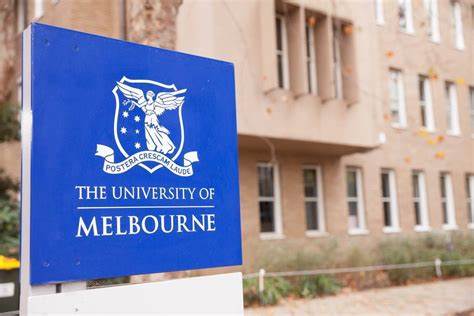School History
The University of Melbourne was established in 1853 following a proposal by Hugh Childers. It received an annual endowment of £9,000 and a special grant of £20,000 for buildings. The foundation stone was laid on 3 July 1854, and classes commenced in 1855 with three professors. The original buildings were opened on 3 October 1855. Over time, the university established a law school in 1857, a Faculty of Engineering in 1861, and a School of Medicine in 1862. The residential colleges were opened in 1872. The first chancellor, Redmond Barry, served until he died in 1880. The wealth generated from Victoria’s gold rush made the university’s establishment possible. In 1881, the admission of women was celebrated as a victory, with Julia ‘Bella’ Guerin becoming the first woman to graduate from an Australian university in 1883.

In the early 1900s, the University of Melbourne expanded its course offerings and experienced a growth in student enrollment. During this time, new buildings were constructed, and the university became a leader in research. The university expanded further in the 1980s and 1990s through amalgamations with tertiary colleges. The Melbourne Model, a significant curriculum restructure, was introduced in 2008, replacing traditional undergraduate degrees with a two-degree structure. This led to both controversy and growth for the university.

In recent years, the University of Melbourne underwent a restructuring that led to staff layoffs and a transfer of administrative responsibilities to academic staff. The university also experienced controversies over high executive salaries and a toxic workplace culture within the Faculty of Arts. The COVID-19 pandemic necessitated a shift to online teaching, resulting in job losses and financial challenges. The university was also involved in wage theft and underpayment controversies towards casual staff. Despite these challenges, the university continues to invest in capital works and plans to open a new campus in 2026. A recent speech policy was also implemented to protect transgender individuals while preserving freedom of speech. Union members have announced strikes seeking higher wages.
Campuses
The University of Melbourne has multiple campuses in metropolitan and regional areas. The Burnley campus focuses on horticultural courses, while the Southbank campus offers performing arts, visual arts, film and television, and music courses. Veterinary science is taught at the Werribee campus. The Creswick and Dookie campuses are used for forestry and agriculture courses, while the Shepparton campus is dedicated to rural health. The university also co-owns the Melbourne Business School. A new campus in Fishermans Bend is being planned for the Faculty of Engineering and Information Technology and Architecture, Building, and Planning.
Parkville Campus
The Parkville campus is the main campus of the University of Melbourne. It was founded in 1853 and is located just north of Melbourne’s central business district. The campus features a range of amenities, including cafes, gyms, libraries, and shops. It is surrounded by a knowledge precinct that includes hospitals and research institutes. The campus showcases period architecture, including the restored Old Quadrangle and the new Wilson Hall. It has been used as a filming location for movies. The Arts & Cultural Building on the campus houses the Union and Guild Theatres.

Southbank Campus
The Southbank campus is home to the Victorian College of the Arts and the Melbourne Conservatorium of Music. It is within Melbourne’s creative arts precinct and features purpose-built facilities for theatre, dance, film, visual arts, and music. A significant capital works project was completed in 2019, including a new state-of-the-art conservatorium and the conversion of historic buildings for education and research. The campus has received significant support from the Victorian State Government for arts education.
Burnley Campus
The Burnley Campus is located in Burnley, Melbourne, and focuses on ornamental and environmental horticulture. It has heritage-listed gardens and offers various courses and research opportunities in urban landscape and park management.

Creswick Campus
The Creswick campus, situated in Creswick, northwest of Melbourne, specializes in forest science education and research. It is dedicated to forest industry, conservation, and molecular biology research, with a diverse range of scientists and experts in various fields.
Other Campus
The Dookie campus has served as the university’s rural hub for agriculture education since 1886. It is located between Shepparton and Benalla and covers 2440 hectares of land, offering various facilities and subjects in agriculture, science, commerce, and environments. The Shepparton Medical Centre campus is part of the Melbourne Medical School and provides comprehensive primary healthcare services. The Werribee campus focuses on veterinary research and teaching, while the Fishermans Bend campus is currently being designed for engineering and information technology studies. The university also had former campuses in Glenormiston, Longerenong, McMillan, and Gilbert Chandler.
Organisation and administration
Governance
The University of Melbourne is governed by the University of Melbourne Act 2009. The Council, chaired by the Chancellor, appoints the Vice-Chancellor, approves budgets, and oversees academic and commercial activities. The Academic Board ensures quality in teaching and research. The Executive Committee manages the university’s operations, and university leadership includes the Chancellor, Vice-Chancellor, and senior executives.
Endowment
The University of Melbourne has an endowment of $1.335 billion, the largest in Australia. Following the 2008 recession, the university underwent restructuring and job cuts. The Believe fundraising campaign raised $500 million by 2016 and aimed to raise $1 billion more by 2021.
Faculties and present deans
The University of Melbourne is divided into nine faculties, encompassing all central research and teaching departments.
- Faculty of Architecture, Building and Planning: Julie Willis.
- Faculty of Arts: Russell Goulbourne.
- Faculty of Business and Economics: Paul Kofman and Ian Harper (co-deans).
- Melbourne Graduate School of Education: Jim Watterston.
- Faculty of Engineering and Information Technology: Mark Cassidy.
- Faculty of Fine Arts and Music: Marie Sierra.
- Melbourne Law School: Matthew Harding.
- Faculty of Medicine, Dentistry and Health Sciences: Jane Gunn.
- Faculty of Science: Moira O’Bryan.
Rankings
- In the QS World University Rankings 2024, the University of Melbourne was ranked 14th (1st nationally).
- Times Higher Education ranked Melbourne 33rd globally (1st in Australia) in the 2021-2022 iteration of its annual World University Rankings.
- In 2022, it ranked 33rd among the universities worldwide by SCImago Institutions Rankings.
- In the most recent CWTS Leiden Ranking, Melbourne was ranked 29th globally (1st nationally).
- The university was ranked 33rd globally (1st in Australia) in the 2021 Academic Ranking of World Universities (ARWU) league table publication.
- According to QS World University Subject Rankings 2020, the University of Melbourne is ranked 10th in law, 12th in education, 16th in accounting and finance, 17th in social policy and administration, 19th in sociology, 22nd in environmental studies and 23rd in linguistics.
- Although the University of Melbourne ranks highly in academic rankings, the university ranks poorly in student satisfaction ratings. In 2021, the University of Melbourne had the lowest student satisfaction out of all Australian universities, with an overall satisfaction rating of 63.1, lower than the national average of 73.
Student life
Student Accommodation in Melbourne
Melbourne University currently has ten residential colleges, seven located in an arc around the cricket oval at the northern edge of the campus, known as College Crescent. The other three are located outside of the university grounds. Most of the university’s residential colleges also admit students from RMIT University and Monash University, Parkville campus, with selected colleges also accepting students from the Australian Catholic University and Victoria University.
For a wide range of off-campus apartments near the University of Melbourne, visit the uhomes website or app. View photos and real videos to understand each apartment’s condition better.

Student unions and associations
The University of Melbourne has two student organizations: the University of Melbourne Student Union (UMSU) and the Graduate Student Association. UMSU focuses on creating a quality campus experience, while GSA provides support and events for graduate students. The university offers over 200 clubs and societies affiliated with UMSU and over 100 groups affiliated with GSA. UMSU also runs the student magazine Farrago and has a theatre department in the Arts and Culture Building.

Melbourne University Sport
Sport at The University of Melbourne is managed by Melbourne University Sport (MU Sport). They oversee all sports and fitness facilities, programs, and activities. Melbourne University Sport Fitness Centre membership is available to students, staff, alumni, and the community. MU Sport offers various sporting clubs and facilities, including a gym, group fitness classes, a swimming pool, and more. Notable clubs include the Melbourne University Football Club, Melbourne University Lacrosse Club, and Melbourne University Cycling Club.
Awards
- The University of Melbourne Award acknowledges individuals who have made significant and lasting contributions to the university and its scholarly community. Recipients are honoured with bronze plaques along Professors Walk on the Parkville campus.
- The Patricia Grimshaw Awards for Mentor Excellence are given annually to University of Melbourne staff members who demonstrate exceptional mentoring skills and behaviours. This award, launched in March 2008, is named after historian Patricia Grimshaw, renowned for her mentorship of postgraduate students and younger colleagues.
- The Dublin Prize, established in 1910 by Trinity College, Dublin graduates, recognizes current or former students who have made notable original contributions to literature, science, or art during the previous year.
Conclusion
In conclusion, the University of Melbourne is a leading institution in Australia, renowned for its rich history, diverse campuses, effective organization and administration, impressive rankings, vibrant student life, and numerous prestigious awards. With a legacy dating back to 1853, the university has continuously evolved to provide an exceptional educational experience. Its multiple campuses offer state-of-the-art facilities and a conducive environment for learning and research. The university’s commitment to excellence is reflected in its high national and global rankings, solidifying its reputation as a top-tier institution. Beyond academics, the University of Melbourne fosters a thriving student community with many clubs, societies, and sports activities. Moreover, the university takes pride in recognising outstanding individuals through various prestigious awards, demonstrating its commitment to nurturing talent and celebrating excellence. As a leading institution, the University of Melbourne continues to shape the future by empowering generations of students and contributing to advancing knowledge and society as a whole.






